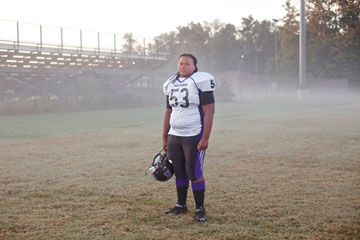
Eighteen-year-old Dre Gambrell doesn't look like the sentimental type. A defensive tackle at Potomac Falls High, he's a big athlete at a big, diverse 1,600-student school in Northern Virginia. A guy like Dre doesn't have to look too hard for a date, but not long ago he fell for a girl who wasn't in his usual universe--a pretty girl, a friend of a friend from another school. He tried to get to know her, but their conversations stalled. So Dre thought he'd do something creative to impress her: "I went on Instagram and took some of her pictures and made a cute little collage and told her I was going to make it my phone wallpaper so I could have something to think about her every day." Her reaction was not what he expected. It was something along the lines of "Ewww ... That's creepy as hell. Why would you do that?" Dre backed off, but now every time he happens to see her, she still makes fun of the collage.
Dre is complicated. While he's capable of romantic gestures and feeling the sting of rejection, he's also capable of sophisticated manipulation. Sometimes, as he explains it, he'll ask girls to send him pictures of themselves partly undressed, and not for the reason one might expect. "If the girl lies a lot, goes around saying she doesn't like me ... I'll have that picture of her," he says. In an environment where looking as if you've been rejected in front of your friends is tough to stomach, the images are insurance. Sometimes, Dre says, he'll ask for a picture just to see if a girl will send it.
Such is the code of Boy World--a place where the rules of courtship shift by the hour and the Internet can accelerate any teen impulse to the speed of light. As an entire generation of parents panics about hookup culture and its effect on their daughters, it's easy to write off the emotional lives of boys. (Even the word hookup is fraught with ambiguity; it can refer to any kind of physical intimacy ranging from kissing to intercourse, though among high school kids it's less likely to be the latter.) Boys often wind up portrayed as either opportunistic perpetrators of the worst sexual behaviors or thoughtless beneficiaries of an era in which boys get sex and girls get hurt.
But is that really what boys want?
As the mother of two boys who's worked with teens for more than 20 years--and having previously written a book about girls' interior lives and social dynamics--I wanted to delve deeper. So I spent two years researching my new book to better understand boys and the challenges they face. I explored the latest research, talking to experts and examining studies in fields ranging from psychology to the neuroscience of how boys' brains are wired. I also worked with and interviewed pediatricians, occupational therapists and learning specialists. But--most critically--I conducted detailed ongoing conversations with hundreds of boys and young men across the U.S. (Straight and gay boys participated. I saw their issues as intertwined, and I focused on how homophobia and the performance aspect of masculinity affect both straight and gay boys.) This cross section of teens I spoke with came from places as varied as elite East Coast academies and New Orleans charter schools, working-class towns in the Midwest and upper-middle-class Southern California suburbs. What I found was striking.
